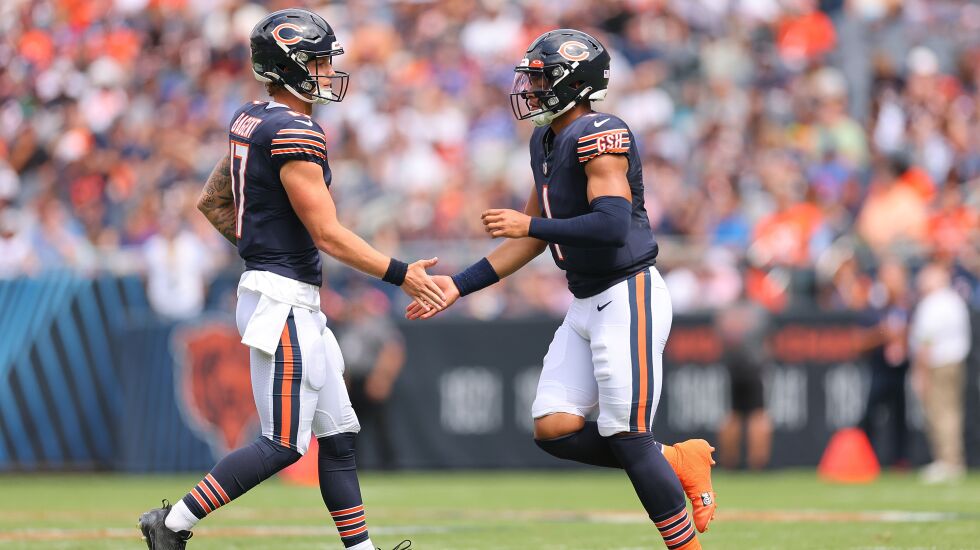
So … there seems to be this low-boiling, underlined sentiment of happiness suddenly floating around the city about one of three things: That either Tyson Bagent is starting at quarterback this week for the Bears or that this could be the beginning of the Tyson Bagent Era in Chicago or that this is the beginning of the end of Justin Fields as the Bears QB-1. Not that all three are problematic, but as they used to spit on those means streets of Sesame, “One of these (things) is not like the other.”
Yeah, one of these (things) just doesn’t belong. Can you tell which (thing) is not like the other?
The perception is it’s the latter. At least from this side of the room. That this new level of excitement has more to do with the removal of Fields than it does Bagent’s installation. And with that perception comes a card called race that some (many) people seem to have a problem with when it gets played. Here, in this, is what gets lost: The History. The history of the Bears when it comes to quarterbacks of color.
While it may not have anything to do with the losses that have made up Fields’ tenure as the first black QB they’ve truly invested in, in the minds and thoughts of those who look beyond his starting record and strictly blaming that record on him, this moment feels like his injury is the mask being used as an excuse to disguise how some (many) fans and media members really feel.
And this is where the reality of the history of the paranoia of the black QB and the Bears comes into full effect. This is about a history that the Bears have little control over but have played a role in over the course of their 103 years of existence. It isn’t about Mitch Trubisky, Cade McNown, Josh McCown, Chase Daniel, Jay Cutler or Andy Dalton individually, it’s about the collective synchronicity of anyone who doesn’t look like them never being handed the keys. And when they are, the field (pun intended) gets shorter.
It’s about this organization passing on Patrick Mahomes and Deshaun Watson and paying Nick Foles $17 million for seven starts and Mike Glennon $18.5M for four. It’s about how of the 10 QBs they drafted in the first round in the team’s history before Fields, none were black. It’s about the fact that of the 35 quarterbacks the Bears went through during the Favre/Rodgers Eras in Green Bay only three were black. Which all of the above might not be racist, but it says something.
It’s about being given a “perceived” fair opportunity and fair chance to establish a presence at the most important position in sports. Something that hasn’t been equitably offered historically which makes us (justifiably) feel a certain way, which leads to us thinking certain ways, which leads us to conclude in certain ways.
It’s deeper than winning. But that’s something some people never understand. Especially in a winning business like the NFL. It’s not that Fields became bad all of a sudden, it’s that the trajectory stopped. And once that happened, it seemed that the belief many had in him just a few months ago stopped as well.
The race card in this situation is not necessarily about the color of someone’s skin or the texture of their culture, it’s about the optics of opportunities when it comes to people who have a certain skin color and textured culture. It’s Lovie Smith all over again.
In the eyes of black folks, it seems like every white coach who followed him got more opportunities to fail than he did. Case-in-proof: Smith was one of the last Bears coaches to have a winning record (Matt Nagy had a 12-4 record in 2018, and was removed after a 6-11 season, not a 10-6 season as Smith was in 2013) and there have been four since he was fired. Again, fired with a winning record. Yet Matt Eberflus has a record 15 games under .500 and goes almost an entire year without winning a game, but he’s still here. Does race play a role in why Eberflus — or any of the other recent coaches — had perceived space to fail that wasn’t afforded Lovie?
That’s the problem: We don’t know. Most white people will say “No.” For many of us, from our darker-colored lenses, it’s pretty much a continuation of the same ol’ same old. Another anti-DEI that we gotta act like it’s not. Something we don’t expect those that aren’t us to understand.
So before some (many) of you jump on us for putting “our” card in play as fast as you seem to act like there’s no room to bring race into this situation, just give slight consideration to how the other 51 cards in the deck have been stacked against us historically in these quarterback scenarios in the NFL. Just give space to how it makes us feel when there’s such an underlined happiness about the replacement of a situation some of us have been waiting our entire lifetimes in this city to experience.
This isn’t about protecting Fields, it’s about something bigger. It’s about protecting a perceived perception of inequality. One that seems to be specific in haunting a certain group of people when it comes to a certain position in football when it comes to a specific team in a certain city that has a perceived history of being defined by race. Because sometimes perception is reality.







